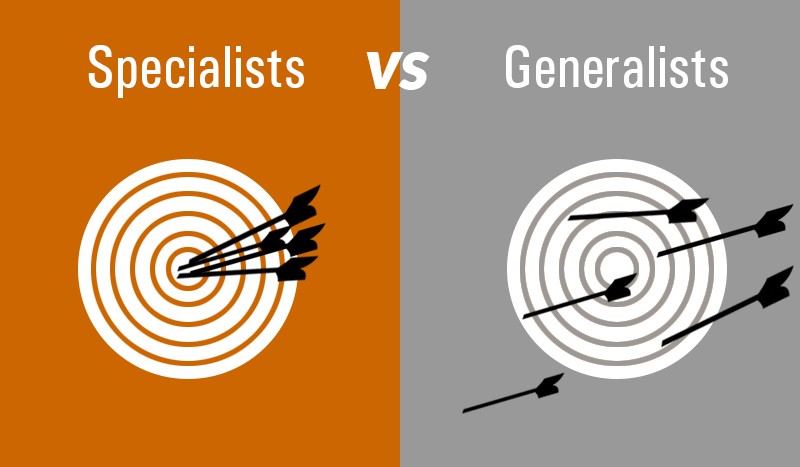General practitioner
We all have been to a general practitioner and some even to a specialist doctor. We all have been sick. Even if we do not go to the doctor for medical treatment, we may need to see a doctor for a medical check-up or health screening as a job application requisite.
Most people are more familiar with a general practitioner (GP). Whenever you start to feel unwell, your first instinct is to see a general practitioner – whether it’s in a clinic, health center, or hospital.

When a general practitioner refers you to a specialist doctor, you may get anxious. There is a natural association between seeing a specialist doctor and having a more severe illness or condition that requires specialized treatment.
It is crucial to learn the critical differences between general practitioners and specialist doctors to clear up the confusion.
Read on to find out more about what differentiates a general practitioner from a specialist doctor.
Definitions of Each Doctor Category
General Practitioner (GP)
A general practitioner is a medical professional who provides care and treatment for general health conditions.
Specialist Doctor
Specialist doctors handle the care and treatment for more specific conditions. Specialist doctors are focused on certain fields in the world of medical science.
Differences Between a General Practitioner (GP) and a Specialist Doctor

General practitioners have a more comprehensive scope of work
The job of a general practitioner is to treat diseases that emerge suddenly and provide an early diagnosis; this includes providing preventive care and educating patients.
Meanwhile, the scope of specialist doctors is focused on a particular area. This is for providing in-depth care and treatment to patients. For example, specialist doctors can specialize in internal medicine, ophthalmology, neurology, and so on.
Specialist doctors undertake a more extended education period than general practitioners.
To become a general practitioner, a person must go through approximately six years of medical education.
On the other hand, being a specialist doctor would mean continuing general medical education to a more specific field. The years of study for a specialist doctor is at least six semesters or three years.
The years of education that a person must complete becoming a specialist doctor is at least nine years. The more specific and complex the medical specialty is, the longer the teaching will be.
General practitioners are also considered to be primary care physicians or gatekeepers.
General practitioners are usually the first in line to treat any patient. You may find general practitioners at the hospital for the following services:
- ER – to provide first aid for any emergency
- Medical check-up or health screening – to provide general examinations and advice on the patient’s medical tests
If a general practitioner determines that it is required for the patient to undergo more specific treatment, then the patient will be referred to a specialist doctor.
4. Medical treatment by specialist doctors cost more
Specialist doctors have a deeper understanding of their fields. Specialist doctors can perform more comprehensive health screening, as they are equipped with in-depth knowledge in their medical specialty field.
Furthermore, specialist doctors generally have access to and the ability to utilize advanced medical equipment. They may advise patients on various medical procedures they can undertake.
In cases where a hospital does not carry special medical equipment or house a particular medical facility, a specialist doctor can refer the patient to another hospital where the equipment is available.
Limited medical equipment is one of the reasons people seek medical treatment abroad.
5. Specialist doctors offer more complex treatments
Specialist doctors are dealing with more complex fields or types of diseases. Therefore, they can offer more therapy options to patients.
General practitioners usually refer the patient to oral therapy (taking medications) or by injection.
In contrast, patients may be asked to undergo therapy that involves more steps, medicines, and equipment with specialist doctors—for example, physiotherapy, immunotherapy, chemotherapy, etc.
The Most Common Specialist Doctors
There are many medical specialties in the world, and these may vary from country to country. Here are some of the most well-known medical things:
Why Should You See a Specialist Doctor?
When you know what kind of disease you are dealing with, it is best to see a specialist doctor.
In general, specialist doctors can immediately determine the correct medical procedure for the patient’s condition following diagnostic tests. In contrast, general practitioners are providing diagnoses of the disease based on symptoms described and present.
Cost and time efficiency
When you get sick, it is recommended to consult a general practitioner first. However, general practitioners can only identify the disease and dispense oral medicines. A specialist doctor will be able to determine the type of medical treatment that suits your condition.
You can consider going direct to a specialist doctor. The consultation fee might be more expensive, but it is deemed effective and worth your money, as you will be able to get a diagnosis and proceed into treatment immediately if necessary.
**Question & Answer on General Practitioner**
**What is a General Practitioner (GP)?**
A General Practitioner, often referred to as a family doctor or primary care physician, is a healthcare professional responsible for providing comprehensive medical care to patients of all ages. GPs serve as the first point of contact for most health concerns and are responsible for diagnosing, treating, and managing a wide range of medical conditions.
**What does a GP do?**
GPs play a vital role in the healthcare system by offering primary care services, including:
* Comprehensive health assessments
* Diagnosis and treatment of acute and chronic illnesses
* Preventive care, such as vaccinations and screenings
* Management of chronic conditions, such as diabetes and hypertension
* Referral to specialists when necessary
**What training does a GP receive?**
To become a GP, individuals typically complete a medical school degree and a residency program in family medicine. This training provides them with the knowledge and skills to diagnose and treat a wide range of health conditions, effectively communicate with patients, and coordinate care with other healthcare providers.
**When should I see a GP?**
You should see a GP for any health concerns, including:
* Acute illnesses, such as colds, flu, and infections
* Chronic conditions, such as diabetes, heart disease, and arthritis
* Preventive care, such as vaccinations and screenings
* Minor injuries or accidents
**How do I find a GP?**
You can find a GP through various methods:
* Referrals from friends or family
* Online directories of healthcare providers
* Your health insurance provider
* Local health centers or clinics
**What is a GP consultation like?**
A GP consultation typically involves:
* A thorough medical history and physical examination
* Discussion of your symptoms and concerns
* Diagnosis and treatment plan
* Prescription of medications or referrals for additional tests or procedures as needed
**Benefits of seeing a GP**
Regular visits to a GP offer numerous benefits, including:
* Early detection and treatment of health conditions
* Improved health outcomes
* Reduced healthcare costs
* Peace of mind knowing you have access to a trusted healthcare professional







